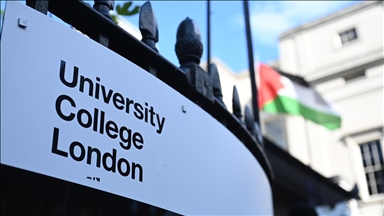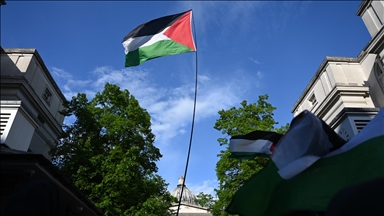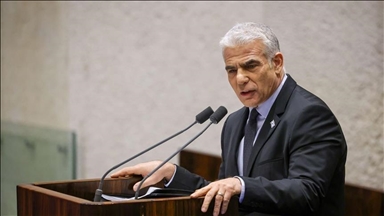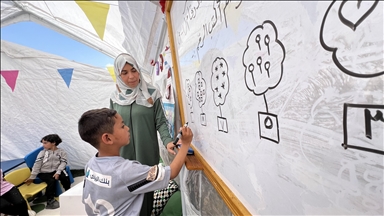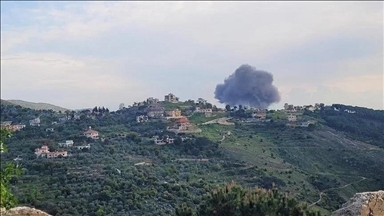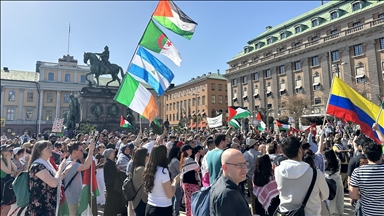UN voices 'war crime concerns' as over 300 bodies found in Gaza mass graves
Uncovering of mass graves in Gaza has sent shockwaves through international circles, says UN
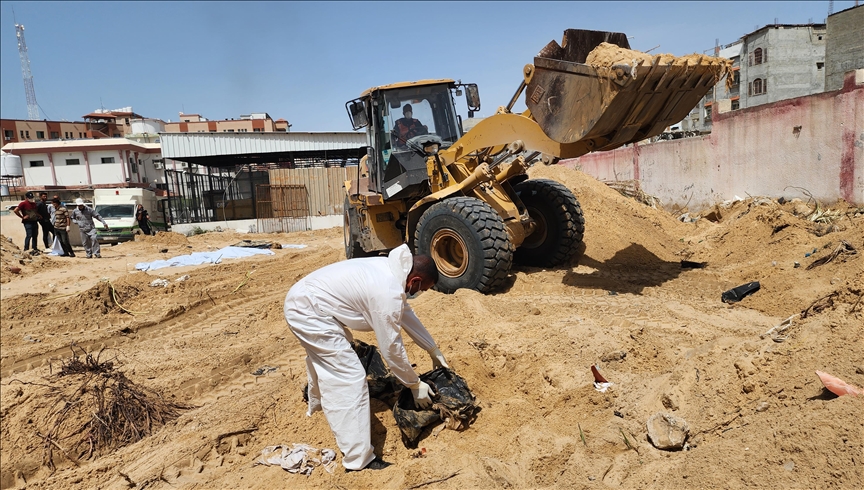 Civil Defense teams uncover 51 more bodies on Wednesday from a mass grave at Nasser Hospital in Khan Younis city in the southern Gaza Strip on April 24, 2024.
Civil Defense teams uncover 51 more bodies on Wednesday from a mass grave at Nasser Hospital in Khan Younis city in the southern Gaza Strip on April 24, 2024.
ISTANBUL/GENEVA
The UN officials said mass graves were found in Gaza with Palestinians stripped and bound, raising war crime concerns amid ongoing Israeli airstrikes.
Over the weekend, the uncovering of mass graves in Gaza has sent shockwaves through international circles, raising serious concerns about potential war crimes amid ongoing Israeli airstrikes in the region, a UN report said on Tuesday.
The discovery was made at Nasser Hospital in Khan Younis and Al-Shifa Hospital in Gaza City, with a total of 283 bodies unearthed at Nasser Hospital alone, of which 42 have been identified.
"Among the deceased were allegedly older people, women and wounded, while others were found with their hands…tied and stripped of their clothes,” said Ravina Shamdasani, spokeswoman for the UN High Commissioner for Human Rights.
"Some of them had their hands tied, which of course indicates serious violations of international human rights law and international humanitarian law, and these need to be subjected to further investigations," Shamdasani added.
"What we need is an immediate cease-fire," she reiterated.
The situation escalated further with the revelation of additional bodies at Al-Shifa Hospital.
According to local health authorities in Gaza, approximately 30 bodies were found buried in two graves within the hospital's premises. Despite efforts, only 12 of these individuals have been identified so far.
More casualties may exist, despite the Israeli Defense Forces' claim of 200 Palestinians killed during the Al-Shifa medical complex operation, Shamdasani said.
UN slams latest series of Israeli strikes, killing women, children
The UN human rights chief on Tuesday decried the latest series of Israeli strikes on Gaza, killing mostly women and children.
Volker Turk's remarks came after at least nine children among 16 Palestinians were killed on Sunday in an Israeli bombing targeting several homes east of Rafah in the southern Gaza Strip.
"The latest images of a premature child taken from the womb of her dying mother, of the adjacent two houses where 15 children and five women were killed - this is beyond warfare," OHCHR spokesperson Ravina Shamdasani told a UN briefing in Geneva, reading Turk's statement on the matter.
Turk reiterated such an operation in Rafah would lead to further breaches of international humanitarian law and international human rights law, as well as it would "risk more deaths, injuries and displacement on a large scale – even further atrocity crimes, for which those responsible would be held accountable."
He also said he was "horrified" by the destruction of the Nasser Hospital and Al-Shifa Hospital and the reported discovery of mass graves in and around these locations, calling for "independent, effective and transparent" investigations into the deaths.
"The intentional killing of civilians, detainees, and others who are hors de combat (someone who cannot fight back) is a war crime," he added.
On "grave human rights violations" continuing in the occupied West Bank, Turk said that despite international condemnation of massive illegal settler attacks from April 12-14 facilitated by the Israeli Security Forces (ISF), "settler violence has continued with the support, protection, and participation of the ISF."
Meanwhile, in the West Bank, grave human rights violations persist despite international outcry over illegal settler attacks facilitated by Israeli security forces. The recent operation in Nur Shams refugee camp and Tulkarem city resulted in the deaths of 14 Palestinians, including three children, further exacerbating tensions in the region.
Condemnations from all over world
Germany on Wednesday urged an investigation into media reports of mass graves at two Gaza hospitals, stressing the need for full clarification, said Christian Wagner, a deputy Foreign Ministry spokesman in Berlin.
Egypt and Saudi Arabia condemned Israeli war crimes and called for an international inquiry into reports of mass graves in Khan Younis city in southern Gaza.
“It is regrettable and disgraceful that international law and human values continue to be violated so crudely in front of the whole world,” the Egyptian Foreign Ministry said in a statement.
Also, the Organization of Islamic Cooperation (OIC) condemned Israel's "horrific massacres" of Palestinians, saying the discovery is an indication that "hundreds of displaced, injured and the sick as well as medical convoys were subjected to forms of torture and abuse before they were executed and given mass burial."
The Arab League convened an emergency meeting to discuss Israel's continued genocidal war, the discovery of mass graves in Gaza and a US veto against Palestine’s full UN membership.
Israel has waged a brutal offensive on the Gaza Strip since a cross-border Hamas attack on Oct. 7 last year, which Tel Aviv says killed nearly 1,200 people.
At least 34,151 Palestinians have since been killed, mostly women and children, and 77,00 others injured amid mass destruction and severe shortages of necessities.
The Israeli war has pushed 85% of Gaza’s population into internal displacement amid acute shortages of food, clean water and medicine, while 60% of the enclave's infrastructure has been damaged or destroyed, according to the UN.
Israel stands accused of genocide at the International Court of Justice. An interim ruling in January ordered Tel Aviv to stop genocidal acts and take measures to guarantee that humanitarian assistance is provided to civilians in Gaza.



